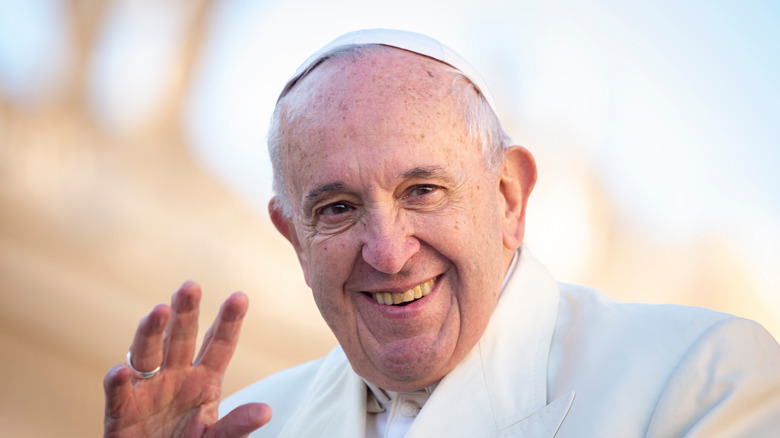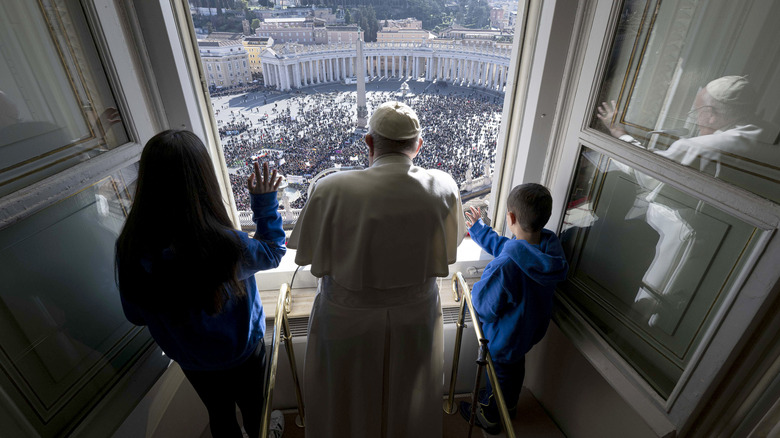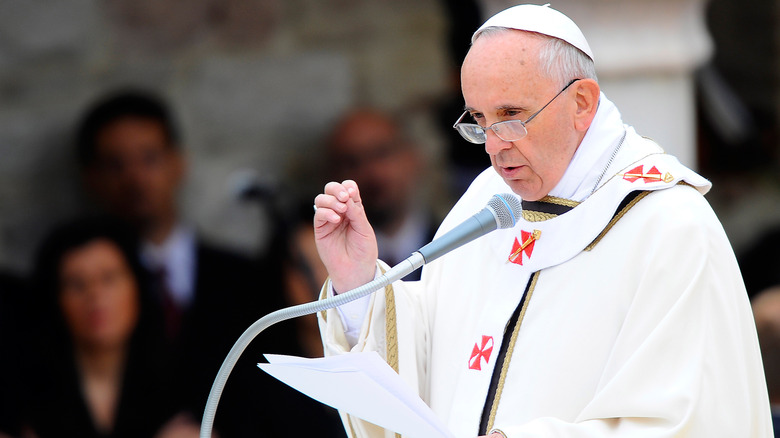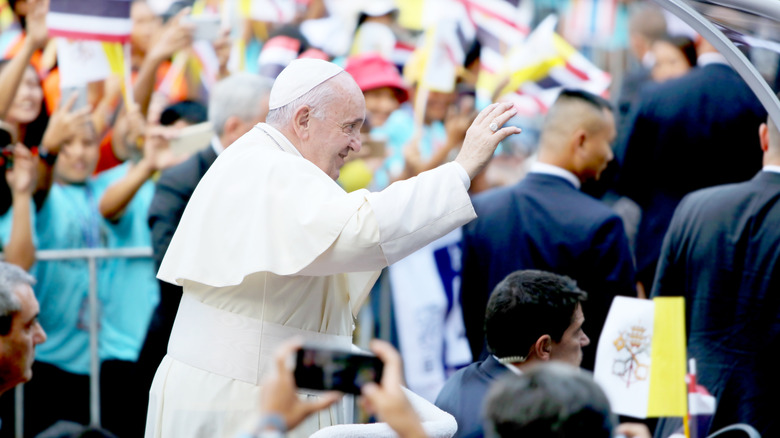Pope Francis Dead At 88
The first Latin American pontiff, Pope Francis, who served as the leader of more than 1.3 billion Catholics across the globe for over a decade, has died at the age of 88.
Vatican officials announced the pope's passing on Easter Monday, April 21, 2025. His death followed ongoing complications from chronic lung disease that started in his youth. But his health had visibly declined in recent years, culminating in a prolonged hospital stay in February 2025 — the longest of his 12-year papacy — due to a respiratory issue that eventually escalated into double pneumonia. "Dearest brothers and sisters, with deep sorrow, I must announce the death of our Holy Father Francis," Cardinal Kevin Farrell announced on the Vatican's TV channel. "At 7:35 this morning, the Bishop of Rome, Francis, returned to the house of the Father."
Born Jorge Mario Bergoglio in Argentina, Francis first joined the Society of Jesus in 1958 and went on to write history. His election as pope in 2013 set many firsts — not only was he the first-ever Jesuit pope, but, as mentioned, he was also the first pontiff from Latin America. Pope Francis established his papacy by presenting himself as a humble leader, often exuding gentleness and approachability. He appeared in public in simple clothing, and refused to live in the more luxurious papal apartments in the Vatican. In his bid to launch a "revolution of tenderness" amongst Catholicism and discard commercial "throwaway culture," as America Magazine cites, he also tended to irk conservative Catholics who preferred morally staunch leadership, as The New York Times discusses.
Humble beginnings on the front line
Pope Francis was the 266th pope in a lineage that traditionally spans back to Peter, disciple of Jesus. National Today describes the pope's humble beginnings, which began with his working-class birth in Argentina to an accountant father and housewife mother. He attended a technical secondary school where he studied chemistry and worked in a chemistry lab for a bit. He also had early, very hands-on jobs like janitor and bouncer that might have presaged his later papal attitude of reaching out to common people.
Two years after joining the Society of Jesus (Jesuits), Pope Francis took his vows of poverty, chastity, and obedience, as Vox states. It would take almost a decade more, until 1969, for him to be officially ordained as a priest. The National Catholic Reporter discusses how the Jesuit order shaped Pope Francis' attitude towards faith, choice, and his eventual papacy. The Jesuits, an all-male order, can be described as having a "military-style structure and ethos" that prefers missionary work, global-mindedness, and concrete action over other approaches.
As National Catholic Reporter quotes, Pope Francis was attracted to Jesuit militarism in his younger years, particularly the idea of being "on the front lines of the church." Pope Francis got his wish during Argentina's "Dirty Wars," when the nation's military dictatorship started murdering citizens. On The World, Pope Francis expressed remorse at not doing more to push back against the dictatorship, as he considered himself "put into the job too early."
Exiled and returned a changed man
National Today tells us that Pope Francis served as Argentina's Jesuit provincial superior from 1973 to 1979, a period that overlapped with Argentina's military junta. Back then he was known simply by his last name Bergoglio, or even just Father Jorge. On National Catholic Reporter, Pope Francis described his young self as "authoritarian" and too quick to make decisions. At the time he seemed to openly oppose "liberation theology," a Marxist-influenced ideology that favored greater freedoms for the poor, as Wander Argentina explains. He even once "locked horns" with two people under him and exiled them. As The World explains, those individuals got arrested and tortured by the Argentinian government, who took them for malcontents.
All such sociopolitical upheaval came to a head when Pope Francis himself got exiled, per Wander Argentina. He spent time in Germany and then Cordoba, Argentina, before coming back a changed man. Pope Francis took to Buenos Aires' "shantytowns" and spent most of this time amongst the poor holding sermons, conducting communion, and apparently even literally washing people's feet. Such outreach made him beloved in his hometown, a reputation that he carried to his death. In 1998 he became archbishop of Buenos Aires, and in 2001 Pope John Paul II made him a cardinal. In 2014, the book Bergoglio's List presented evidence that Pope Francis had opposed the Argentinian dictatorship all along, and had even built a secret network to help over 100 people flee to safety.
A controversial pope of the people
Pope Francis was elected pope in 2013 following Pope Benedict XVI's resignation. From the second Pope Francis took his position, he ignited equal parts admiration and annoyance from both Catholic and secular circles. On one hand, he was hailed as a true, down-to-Earth pope of the people who acted according to principles of Christian love and charity — a sort of "liberal Catholic," so to speak, as The New York Times defines it. As The Washington Post reports, such theological liberalism extended to calling atheists redeemable, refusing to proclaim judgment on gay people, calling it "leprosy" when priests treat the church like a career, and allowing all priests of all ranks to forgive women for having abortions. In his later years, he condemned anti-gay laws and openly welcomed queer people into the church, as People discusses.
On the other hand, this less-than-dogmatic stance is exactly why some folks didn't like him. Some, like those on Unheard, decried him a hypocrite, particularly when it came to shielding priests accused of sexual abuse or apologizing to indigenous people. Pope Francis was simultaneously lauded for invigorating the church and blamed for causing its numbers to decline. He was admired for extending an olive branch to groups previously marginalized by the church, but castigated for not doing enough. Only time will tell how history remembers him, but for now, literal billions across the world can unite in mourning.



